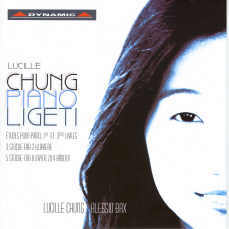

 |
 |
|
|
Lucille Chung plays Ligeti (2) György Ligeti DREI STÜCKE FÜR ZWEI KLAVIERE; FÜNF STÜCKE FÜR KLAVIER ZU VIER HÄNDEN (Works for two pianos and piano four hands with ALESSIO BAX, piano) ÉTUDES POUR PIANO, PREMIER et TROISIÈME LIVRE (Lucille Chung, solo piano) Dynamic CDS 434 This is a a delightful CD, cleverly compiled and ordered; also a pleasing family memento, because we are told that in this second volume the young Canadian pianist Lucille Chung, who completes with it her recording of all Ligeti’s piano output, has collaborated with her husband-to-be, Leeds 1st prizewinner Alessio Bax in the works for two pianos and piano four hands. Their rapport, colouration, simultaneous chording and transparancy of textures (on Yamaha pianos) is remarkable, and the whole thing has a joyous feeling of delight in youthful virtuosity, with Ligeti's never far absent sense of humour often in evidence. They begin with the three innovative and mature pieces for duo-pianos from the mid-'70s, then do wonders with the much earlier Bartokian five pieces for piano duet, showing a crisp articulation which should bring them into the recital for that humble domestic medium, which is now coming back to favour largely because of the recognition of the marvellous quality of Schubert's contribution to the genre. The last pieces of that early set of duets are quite testing, then follows the first of the still expanding Books of Études which have won a place in the repertoire as central as those of Chopin and Debussy. Unless you are keeping tabs on the track list, you would not immediately realise that this increase in complexity is achieved by two hands, not four! These pieces of Books One and Three are an inexhaustible source of pleasure, whether fumbling to decipher the scores (which require one's brain to split into two) at the keyboard, or listening to the increasing range of recordings; everyone aspiring to be a "contemporary pianist" has to try to master them. They are characterised well, as is the other music included, in Danio Prefumo's notes, likewise in the earlier volume. Lucille Chung and Alessio Bax have excellent websites, worth visiting for fuller background, and including a wide range of reviews. For the first (you should certainly purchase them as a pair) I cannot do better than to endorse Stephen Pettitt's opinion in The Sunday Times: " - - This disc shows her to be a considerable artist, admirable for her bold choice of music - Ligeti is not, for most pianists, at the heart of the repertoire - for her obvious enjoyment of the character of the music, and for her ease with the extreme technical difficulties posed by the second book of Etudes (1988-93). There's more besides: the skittish Capriccios of 1947, a post-Bachian Invention of 1948, and the 11 pieces of Musica Ricercata (1951-53), which progressively encompass first one, then two, then three pitches, and so on as the cycle proceeds. Gloriously experimental, this is music of a purity and intellect that has rather gone out of fashion. More's the pity."
|